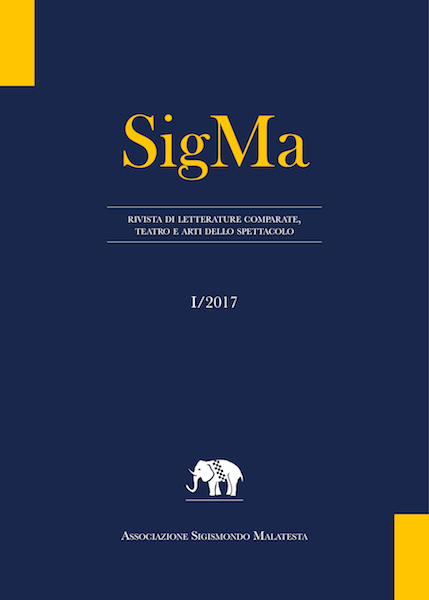Meditazioni neometriche. Appunti sulla ripresa delle forme chiuse nella poesia italiana contemporanea
Abstract
Questo articolo mira ad illuminare alcuni aspetti del ritorno alla metrica nella poesia italiana contemporanea, prendendo l’avvio da alcune raccolte poetiche, pubblicate nella prima metà degli anni Ottanta, che reintroducevano forme metriche chiuse, sia riprese dall’antica tradizione italiana (quali sonetti, ballate, terzine ecc.), sia create ex novo. In particolare, il contributo prende in considerazione l’opera di due antenati novecenteschi della scuola neometrica, Edoardo Cacciatore e Toti Scialoja, individuando una loro possibile influenza su poeti di una generazione più giovane quali Patrizia Valduga, Marco Ceriani e Tommaso Ottonieri. Uno spazio più ampio vi è dedicato alla figura di Gabriele Frasca, un artista con grandi doti tecniche che è riuscito lungo l’intero arco della sua carriera a conciliare tradizione e innovazione, dimostrando al contempo una rara conoscenza dei problemi teorici della poesia. Infine, questo articolo cerca di definire i concetti di manierismo, “coscienza metrica” e “metrica come forma simbolica, nonché di collocare la nascita della corrente neometrica nel contesto della crisi della poesia italiana verificatosi negli anni Ottanta, nonché del coevo straordinario sviluppo dei mezzi di comunicazione di massa.
Downloads
SigMa pubblica in internet, ad accesso aperto, con licenza:
|
|
CCPL Creative Commons Attribuzione |
L'autore conserva il copyright sul suo contributo, consentendo tuttavia a chiunque "di riprodurre, distribuire, comunicare al pubblico, esporre in pubblico, rappresentare, eseguire e recitare l'opera", purché siano correttamente citati l'autore e il titolo della rivista. L’autore, al momento della proposta di pubblicazione, è inoltre tenuto a dichiarare che il contenuto e l’organizzazione dell’opera è originale e non compromette in alcun modo i diritti di terzi, né gli obblighi connessi alla salvaguardia di diritti morali ed economici di altri autori o di altri aventi diritto, sia per testi, immagini, foto, tabelle, sia per altre parti di cui il contributo può essere composto. L’autore dichiara altresì di essere a conoscenza delle sanzioni previste dal codice penale e dalle leggi speciali per l’ipotesi di falsità in atti ed uso di atti falsi, e che pertanto Reti Medievali è esente da qualsiasi responsabilità di qualsivoglia natura, civile, amministrativa o penale, e sarà dall'autore tenuta indenne da qualsiasi richiesta o rivendicazione da parte di terzi.

